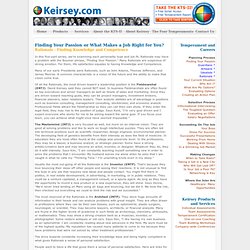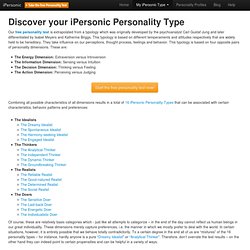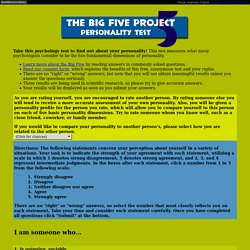

Personality Test. The Sixteen Personality Types - High-Level. ISTJ - The Duty Fulfiller Serious and quiet, interested in security and peaceful living.

Extremely thorough, responsible, and dependable. Well-developed powers of concentration. Usually interested in supporting and promoting traditions and establishments. Well-organized and hard working, they work steadily towards identified goals. Click here for a detailed description of ISTJ. ISTP - The Mechanic Quiet and reserved, interested in how and why things work. Click here for a detailed description of ISTP. ISFJ - The Nurturer Quiet, kind, and conscientious.
Click here for a detailed description of ISFJ. ISFP - The Artist Quiet, serious, sensitive and kind. How_to_live_with_introverts_by_sveidt-d4tfoyo.jpg 300×2000 pixels. PersonalityZone - Temperament and Your Career. Finding Your Passion or What Makes a Job Right for You?

Rationals - Finding Knowledge and Competence In this five-part series, we're examining each personality type and job fit. Rationals may have a problem with the Boomer phrase, "Finding Your Passion. " Many Rationals are suspicious of strong emotion. For them, life satisfaction equates to having Knowledge and Competence. Many of our early Presidents were Rationals, such as John Adams, Thomas Jefferson, and James Monroe. 10 Myths About Introverts.
The iPersonic Personality Type. Our free personality test is extrapolated from a typology which was originally developed by the psychoanalyst Carl Gustaf Jung and later differentiated by Isabel Meyers and Katherine Briggs.

This typology is based on different temperaments and attitudes respectively that are widely held to be hereditary. They take influence on our perceptions, thought process, feelings and behavior. This typology is based on four opposite pairs of personality dimensions. These are:The Energy Dimension: Extraversion versus IntroversionThe Information Dimension: Sensing versus IntuitionThe Decision Dimension: Thinking versus FeelingThe Action Dimension: Perceiving versus Judging Start the free personality test now! Combining all possible characteristics of all dimensions results in a total of 16 iPersonic Personality Types that can be associated with certain characteristics, behavior patterns and preferences:
Personality Theories. The Big Five Personality Test. Directions: The following statements concern your perception about yourself in a variety of situations.

Your task is to indicate the strength of your agreement with each statement, utilizing a scale in which 1 denotes strong disagreement, 5 denotes strong agreement, and 2, 3, and 4 represent intermediate judgments. In the boxes after each statement, click a number from 1 to 5 from the following scale: Strongly disagreeDisagreeNeither disagree nor agreeAgreeStrongly agree There are no "right" or "wrong" answers, so select the number that most closely reflects you on each statement.
Take your time and consider each statement carefully. Personality Test Site. Personality Disorder Test. Complete relationship chart between psychological ("personality") types. Personality Comparison Chart. Personality types. Personality Theories. Personality types. Big Five personality traits. In psychology, the Big Five personality traits are five broad domains or dimensions of personality that are used to describe human personality.

The theory based on the Big Five factors is called the five-factor model (FFM).[1] The five factors are openness, conscientiousness, extraversion, agreeableness, and neuroticism. Acronyms commonly used to refer to the five traits collectively are OCEAN, NEOAC, or CANOE. Beneath each global factor, a cluster of correlated and more specific primary factors are found; for example, extraversion includes such related qualities as gregariousness, assertiveness, excitement seeking, warmth, activity, and positive emotions.[2]:24 The Big Five model is able to account for different traits in personality without overlapping.
Empirical research has shown that the Big Five personality traits show consistency in interviews, self-descriptions and observations. §Five factors[edit] Openness to experience: (inventive/curious vs. consistent/cautious). Personality Types. Personality types.